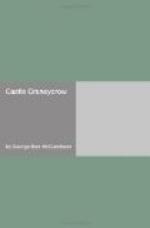He heard others running behind him, and concluded that his fellow guests had regained their wits and were in the chase with him. If the pursued heard the sudden, convulsive laugh of the man behind him he must have wondered greatly. Phil could not restrain the wild desire to laugh when he pictured the sudden and precipitous halt his valiant followers would be compelled to make if the fugitive should decide to stop and show fight. One or more of them would doubtless be injured in the impossible effort to run backward while still going forward.
Blood was streaming down his arm and he was beginning to feel an excruciating pain. Pedestrians were few, and they made no effort to obstruct the flight of the fugitive. Instead, they gave him a wide berth. From far in the rear came hoarse cries, but Quentin was uttering no shout. He was grinding his teeth because the fellow had worsted him in the rather vainglorious encounter on the porch, and was doing all in his power to catch him and make things even. To his dismay the fellow was gaining on him and he was losing his own strength. Cursing the frightened men who allowed the thief to pass on unmolested and then joined in the chase, he raced panting onward. The flying fugitive suddenly darted into a narrow, dark street, fifty feet ahead of his pursuer, and the latter felt that he had lost him completely. There was no sign of him when Quentin turned into the cross street; he had disappeared as if absorbed by the earth.
For a few minutes Philip and the mob—quite large, inquisitive and eager by this time—searched for a trace of the man, but without avail. The count, de Cartier and the Honorable Mr. Knowlton, with several of Mrs. Garrison’s servants, came puffing up and, to his amazement and rage, criticised him for allowing the man to escape. They argued that a concerted attack on the recess amongst the palms would have overwhelmed the fellow and he would now be in the hands of the authorities instead of as free as air. Quentin endured the expostulations of his companions and the fast-enlarging mirth of the crowd for a few moments in dumb surprise. Then he turned suddenly to retrace his steps up the avenue, savagely saying:
“If I had waited till you screwed up nerve enough to make a combined attack, the man would not have been obliged to take this long and tiresome run. He might have called a cab and ridden away in peace and contentment.”
A laugh of derision came from the crowd and the two Frenchmen looked insulted. Mr. Knowlton flushed with shame and hurried after his tall countryman.
“You are right, Quentin, you’re right,” he wheezed. “We did not support you, and we are to blame. You did the brave and proper thing, and we stood by like a lot of noodles—”
“Well, it’s all over, Knowlton, and we all did the best we could,” responded Philip, with intense sarcasm which was lost on Mr. Knowlton. Just then a sturdy little figure bumped against him and he looked down as the newcomer grasped his arm tightly.




